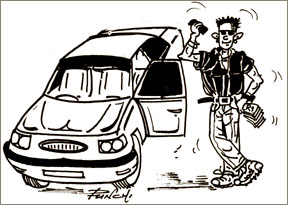The status quest - a Lankan lunacy
by Afreeha Jawad
Behind every status conscious lunacy is an undying thirst for power
that speaks of control and dominance, needless to say its conspicuous
presence even at communal, national and international levels.
 Oft' heard references such as, "he worked under me at one limit (with
emphasis on 'under'), "Oh! that chap was my subordinate" or "he was my
understudy" is noteworthy vis - a - vis the 'status intoxicant'. Oft' heard references such as, "he worked under me at one limit (with
emphasis on 'under'), "Oh! that chap was my subordinate" or "he was my
understudy" is noteworthy vis - a - vis the 'status intoxicant'.
We also hear of minorities and majorities not to forget terms such as
first and third world. Talking of majorities and minorities it was short
termed President D. B. Wijetunge who referred to minorities as grapevine
that created much controversy inviting resentment from ethnic
minorities. Perhaps an unintentional utterance - a clear indication of a
lack of sociological knowledge.
Social divisiveness
Accompanying social divisiveness is the chain of command, social
stratification, gradation, class and what not that breeds much social
inequity followed by a frustrated social whole.
Prior to the advent of systemic indulgence, natural man in his
natural environs was not confronted with whatever is social dichotomy or
divides, of gender, class strata and so on. Yet the concept of power
gained foothold with civisational growth reversing even the noble ideals
contained in such advancement.
Moral decline followed civilisational rise. Family as an institution
meant for social organisation led to heightening of 'I', 'me' and -
'mine' - an ego inflating state. Prior to familial onset, devoid of such
ego, a child's birth saw its deposit into the community following
whatever was maternal instinct.
For instance a mother wouldn't have known who her child was because
he/or she later became community belonging. Come to think of it, there
perhaps would have been countless of King Vessantara's paralle who in an
act of selflessness even gave away his two children to Joothaka Brahmin.
Thus man's first organisational attempt in familial construct led to so
many other unstitutions moving him away from his natural state. As a
result organisational man ended up in a highly disorganised state as he
orchestrated selfish ends into power and domination.
Locating ourselves in local setting, let's take for instance the
feudal social/economic structure. Caste then was benchmark to all
systemic activity and existence. The importance of one's cattle herd and
yardstick to affluence - the preference of male buffaloes over females
and cows over bulls was widespread for their workload and milking
capacity. An increase in herd numbers was considered a man of means. Not
to be missed were pronouncements such as "Haraka baana honda hati
thiyena kenek." In assessing wealth, the importance of paddy land was
not to be overlooked.
"Haraka baanata amatharava Kumburu yaayakma thiyanava nova".
These status symbols of a bygone era when contextualized in today's
class economy runs like this, "Loku yaana vaahana, kolomba hathay loku
bangalawak, kada peyliyak - yamak hamak tiyena wedagat aya."
Cattle and paddy land have found replacement with luxury vehicles,
business ventures instead of fields and farmland and what's more - all
this is even passport to virtue (note reference to 'vedagat aya').
Status symbols
Thus cast based status symbols were different from those in class
environs. In one the people served their kings while the other sees the
social whole working for imperialist forces.
The names of popular business enterprises today, have become
important land marks which in earlier times took the form of huge trees.
Kos gaha mula kaday, siyambala gedera, delgaha langa kadey - these
then are getting back to earlier reference of social stratifications
today's class based elite strata are the 'neat replace' of the Radhala
or aristocratic top layer in caste environs - namely the Kandyan and
Govigama aristocracy. One never knows where today's contemporary elites'
forbears may have belonged in the earlier social set up - evolution
being so rapid what with those ' Ge' names changing as fast as pillows.
Yet one notices significantly the aversion to root tracing for obvious
reasons bringing to writer mind the famous or rather infamous book 'The
nobodies that became somebodies'. Though there are chances of better
social placement under what is called competitive examinations, yet in
job entry, 'top connections' do matter. The rate of politicisation
builds a new power group of elitists whereby a difference between the
two systems is not visible.
[email protected]
|
